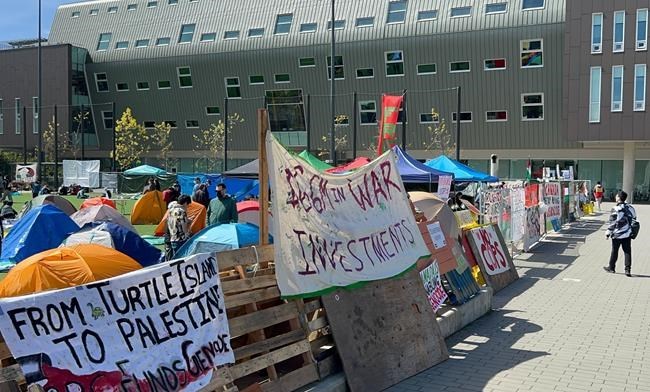VANCOUVER — Pro-Palestinian protesters camped out at the University of British Columbia's Â鶹´«Ã½Ó³»campus are bringing in water, food and other supplies in preparation to stay as long as it takes the school to accept their demands.Â
The encampment that went up Monday has since grown to about 30 tents, with some filled with large quantities of bottled water, food and bedding, while two portable toilets have also been brought in.
A protest spokesman, who would only identify himself as Kevin, said he and others will not leave until their demands are met. Those demands include an academic boycott of Israeli universities and that UBC divests itself from Israeli companies that they say are complicit in "oppression and genocide" of Palestinians.Â
"I'm pretty confident we can stay as long as it takes," said Kevin, who identified himself as a second-year student at UBC.
"Everybody here is talking to each other, supporting each other. And we have plenty of food, plenty of water. We're here as long as our demands aren't met."
The protest at UBC follows a wave of similar rallies and encampments protesting Israel's offensive in Gaza at universities across North America, including at McGill University in Montreal.Â
There was no visible RCMP presence outside the camp.
UBC spokesman Matthew Ramsey said in a written statement Tuesday that the school is continuing to monitor the situation and warned protesters of several violations of the university's policies.
"These include the removal of items from nearby construction sites and university property, the removal of furnishings from nearby university buildings, minor damage to the buildings and furnishings, and possibly to the turf field, the erection of barricades and the construction of cooking facilities on UBC property, as well as the removal and possible theft of a Canadian flag from a UBC flagpole," Ramsey said.
He said several protesters are not from the school.
"To the extent that inappropriate conduct violates one or more of the University’s policies, individuals may be subject to the University’s disciplinary processes or other appropriate measures under the university’s discrimination policy or student code of conduct."
The response came as school officials at McGill said that they have asked Montreal police to dismantle the camp there because activists are refusing to leave. Police said they are evaluating different avenues to respond to the university's request.
At UBC, about 80 protesters have erected makeshift barriers around the field where they've pitched their tents, using materials ranging from metal fences secured with zip ties and overturned picnic tables to piles of wood pallets and traffic barricades fastened with ropes and bungee cords.
Palestinian flags and banners displaying slogans such as "free Palestine," hang near the protest site.Â
Ramsey had said Monday that the protesters have not been given permission to erect barriers, and the school is in contact with police to monitor the situation.
"Of course, it's hard to not notice … the other movements in North America and also the tensions mounting at McGill so far," Kevin said, noting that officials have deactivated power outlets in and around the field where the encampment is located.
"Even though the police presence from the university hasn't been great and they've been pretty hostile toward us, I'm still pretty confident, how we've been dealing with it pretty well. And the camp is still alive and well."
Inside the camp Tuesday, the atmosphere was festive with music playing and people sitting on lawn chairs or in tents chatting among themselves.
Among the protest banners was a sign notifying attendees of escorts available to the washrooms in nearby school buildings, reminding people that they would need to check in again to re-enter the encampment.
Outside the camp, people wearing Uber Eats shirts are handing out coupons to those passing by, including protesters coming in and out of the camp.
On Monday, B.C. Premier David Eby had called on both the school and student leaders to balance the right to free speech on campus and the need for personal safety for people of all backgrounds.
The Israel-Hamas conflict was sparked by the Hamas Oct. 7 attack in southern Israel where about 1,200 people were killed and some 250 people were taken as hostage.
Israel says the militants are still holding around 100 hostages and the remains of more than 30 others, while the Health Ministry in Hamas-run Gaza says more than 34,000 Palestinians have been killed in the conflict, and about two-thirds of those fatalities are children and women.
This report by The Canadian Press was first published April 30, 2024.
Chuck Chiang, The Canadian Press


